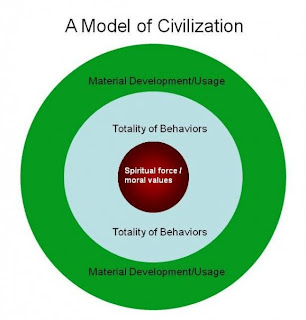The current general belief that science and religion are somewhat intrinsically conflicting with each other is rooted, I believe, in the misunderstanding of both religion and science. The impact of this misunderstanding is wide and such that often “people are faced with the unpalatable choice between highly validated scientific theories of limited scope on the one hand, and unsupported metaphysical speculation on the other. Moreover, circumstances have more often than not forced people to make a choice between these extremes and to live their lives accordingly.”
The followings are excerpts from an article
“Science of Religion” by Dr. William Hatcher which, I felt, has helped to clear up many misconceptions in the two areas.
A cardinal principle of the Bahá’í Faith is that science and religion must be in agreement and harmony. In view of the conflict and confusion which have long existed on this subject, one might think that this principle would be a great rallying-point, attracting large numbers of scientists and religionists to examine deeply the tenets of the Bahá’í Faith. This has not yet proved to be the case, however.
The situation is, I feel, quite analogous to another age-long conflict, the conflict between established religious orthodoxies. The relevant Bahá’í principle here is the essential oneness of religion. Yet there has not been any marked tendency on the part of established religious authorities to look with favor on this basic Bahá’í teaching. Because each orthodoxy has been adamant in its claim to superiority over other orthodoxies, there has been no common willingness to accede to the “leveling” belief that a de facto unity underlies the various great religious systems. Of course, there is a contradiction between the various rites and rituals, dogmas and creeds to be found in the present form of these religious orthodoxies. What the Bahá’í Faith affirms is that these rites, creeds, and dogmas are largely irrelevant to the fundamental teachings, the essential purpose and meaning of religion. These teachings have, without exception, enjoined such qualities as humility, love, compassion, tolerance. Fanatics can find no sanction for their fanaticism in the recorded teachings of their founder.
I have chosen the conflict between orthodoxies as an analogy to the religion-science conflict because I suspect that it is closer than either religionists or scientists would like to admit. Orthodox religionists would dislike the analogy because they have been forced to admit the value of science after an initial resistance, and the idea that they may one day be forced to capitulate in a similar manner before the pervasive value of another religion which they initially misjudged—this would be painful. Scientists would resist the analogy in that it tends to compare science to the dogma of a religious orthodoxy, a comparison which they would regard as invidious. For if anyone is “winning” the so-called religion-science conflict, it is clearly science. Yet, it is not a novel observation that scientists are increasingly assuming the function and role played by priests in earlier societies. They are the initiated, those who explain the great mysteries to the unwashed masses.
Anyone who has had the opportunity to work in a scientific field knows how often serious scientific achievement is embellished with a liberal amount of sham and wordplay. If these are not rituals designed to charm the masses (or one's Dean or the National Science Foundation) they come uncomfortably close to it.
Of course, a scientist would object that all of this is not true science. This, he would say, is the concession which the true seeker after scientific truth must make to the ultra-pragmatic world-at-large. The many exigencies of life in the political and social market place force the scientist, as an individual, into compromises, subtle and not so subtle, with the basic principles of scientific inquiry. But, one might contend, this does not compromise science itself, for anyone can plainly see that its principles are pure and lead to excellent results when applied correctly.
Does not all this sound strangely like the well-worn apology for the failures of religious institutions? “Our institution is divine,” we are told, “but you must not judge it by the 'human element' within it or by the corruption of individual exponents who may be weak and unredeemed.”
The point is that both science and religion are human, social activities. As such, they cannot claim to be purer or more exalted than their ultimate influence on society. This does not mean that such activities do not draw on invisible sources of inspiration and power to produce their effect. It means only that the evidence for the existence of such hidden well-springs of creativity can only be measured by the ultimate, realizable effect which these activities or institutions do indeed produce.
(To be continued…)
"Science and Religion:Nature of the Conflict(VIII)"
"Science and Religion:Nature of the Conflict(VII)"
"Science and Religion:Nature of the Conflict(VI)"
"Science and Religion:Nature of the Conflict(V)"
"Science and Religion:Nature of the conflict(IV)"
"Science and Religion:Nature of the conflict(III)"
Science and Religion: Nature of the conflict(II)
Ref.:
Original paper by Dr. William Hatcher
